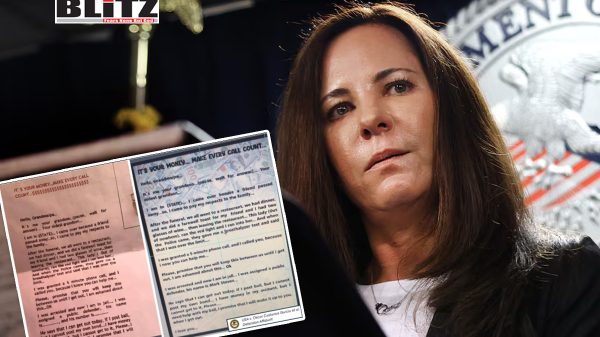Thirteen arrested in $5 million grandparent scam defrauding elderly across US
- Update Time : Thursday, August 14, 2025

Thirteen individuals have been charged in connection with an elaborate scam operation that defrauded more than 400 older Americans out of over $5 million, federal prosecutors announced. The scheme, operating from call centers based in the Dominican Republic, targeted elderly victims with a fraudulent tactic known as the “grandparent scam,” tricking them into believing their grandchildren or close relatives were in urgent danger and needed money immediately.
The US Attorney’s Office for the District of Massachusetts confirmed the charges in a news release issued on August 12. The scheme is particularly insidious because it preyed upon the trust, love, and emotional vulnerability of older adults, many of whom are already facing financial insecurity in retirement. The average age of victims in this case was reported to be 84, underscoring the predatory nature of the scam.
According to Leah B. Foley, the US Attorney for Massachusetts, the scammers’ primary objective was to convince parents, grandparents, neighbors, and friends to part with their life savings under false pretenses. “Their goal,” Foley stated, “was to trick our parents, grandparents, neighbors, and friends into handing over their life savings on false pretenses. And they succeeded.”
Of the 13 individuals charged in federal court in Massachusetts, nine are currently in custody, while two remain at large in the United States and another two are in the Dominican Republic, officials reported. Charges against the accused include conspiracy to commit mail fraud and wire fraud, as well as money laundering conspiracy. If convicted, the suspects could face decades in federal prison. At least one of the defendants has already pleaded guilty.
Central to the operation was 33-year-old Oscar Manuel Castanos Garcia, identified by the US Attorney’s Office as the “ringleader” of the call center network. Castanos Garcia was arrested on August 12 in the Dominican Republic and is expected to be extradited to the United States. Prosecutors allege he orchestrated the scam by directing other operators to follow a scripted approach, carefully crafted to manipulate victims into believing their loved ones were in jail following a car accident and needed immediate bail money.
Scripts obtained by the Department of Justice illustrate the emotional manipulation employed by the scammers. In one example, the supposed family member would plead, “I was granted a 5-minute phone call, and I called you because I know you can help me. Please, promise that you will keep this between us until I get out, I am ashamed about this.” The call typically ended with the perpetrator instructing the victim to say, “I love you,” further enhancing the illusion of authenticity.
The call centers operated out of residential homes in Santiago de los Caballeros and Puerto Plata, according to court documents. The scam’s victims were identified using data obtained from the dark web, demonstrating the increasingly sophisticated methods used by cybercriminals targeting vulnerable populations.
Federal officials described the grandparent scam as a coordinated operation involving multiple roles. “Openers” initiated contact with victims, delivering the initial distressing message, while “closers” were responsible for the follow-up calls that extracted money from victims. Once collected, “runners” transported the cash and laundered it back to the Dominican Republic. The call centers reportedly maintained a “scoreboard” tracking how much each opener-closer pairing collected from victims, incentivizing employees to extract increasingly large sums of money.
In the Massachusetts case alone, operators reportedly posed as public defenders to convince victims that their family members were in legal trouble and needed bail money. Some victims were contacted repeatedly, pressured to provide additional funds, and even misled with stories that a baby had been lost in an accident, intensifying emotional pressure.
Prosecutors noted that the illicit funds facilitated extravagant lifestyles for the scammers. Castanos Garcia, for instance, reportedly spent the money on home upgrades and luxury items, including a boat. Court documents include photographs of Castanos Garcia aboard a yacht, lounging in a hot tub-a stark illustration of the profits reaped from the scheme.
The Massachusetts grandparent scam is part of a broader, alarming trend in elder fraud. FBI data indicate that in 2024, older adults across the United States reported nearly $4.89 billion in losses due to fraud schemes targeting seniors, representing a 43% increase from 2023. The FBI’s Internet Crime Complaint Center (IC3) received 147,127 complaints of elder fraud in 2024, a 46% increase over the previous year, highlighting the rising scale and sophistication of these crimes.
The surge in elder fraud is attributed to several factors. Older adults are often seen as more trusting and less familiar with modern digital threats, making them particularly vulnerable to scams conducted over the phone or online. Additionally, seniors may be less likely to report scams due to embarrassment or fear of losing independence, further emboldening perpetrators.
Federal authorities have also pointed to the globalization of criminal operations as a factor exacerbating the problem. Scammers based abroad, such as in the Dominican Republic, exploit international communication channels and banking systems to target Americans while remaining physically distant, complicating law enforcement efforts. The Massachusetts case involved two years of joint investigation by the FBI, the US Department of Justice’s Office of International Affairs, and Dominican authorities, including the Dominican National Police.
The Massachusetts operation is not an isolated case. In March, a federal grand jury indicted Luis Alfonso Bisono Rodriguez, another Dominican national, in connection with a scheme defrauding five victims of $50,000. Rodriguez was responsible for all aspects of the scam, from initial calls to collecting the money. He pleaded not guilty in July.
Kimberly Milka, acting special agent in charge of the FBI’s Boston Division, described elder fraud as a “growing problem and a shameful crime.” She emphasized that the impact extends beyond financial losses, noting that such schemes rob vulnerable populations of their sense of security, leaving emotional scars alongside monetary damage.
Federal authorities continue to urge vigilance among older Americans and their families. Recognizing the hallmarks of grandparent scams-urgent, emotionally manipulative calls requesting immediate money-remains a key line of defense. Families are encouraged to establish verification protocols, such as calling other relatives to confirm a family member’s situation, and to report suspected scams promptly to local authorities or the FBI.
The recent indictments in Massachusetts underscore the complex, multinational nature of modern elder fraud. By combining psychological manipulation, digital intelligence gathering, and coordinated international operations, scammers are increasingly able to target and victimize some of the nation’s most vulnerable citizens. Federal authorities hope that the arrests and forthcoming prosecutions of the 13 individuals involved in this scheme will serve both as a warning and a deterrent to other criminal networks seeking to exploit older Americans.
As law enforcement continues to combat these scams, raising public awareness and educating seniors about the tactics employed by fraudsters remains critical. While the legal process against the Massachusetts scammers unfolds, the broader fight against elder fraud continues, highlighting the urgent need for vigilance, family communication, and strong international cooperation in the face of increasingly sophisticated criminal operations.










